 Petzlover
Petzlover Dandie Dinmont Terrier is originated from United Kingdom but Red Heeler is originated from Australia. Dandie Dinmont Terrier may grow 23 cm / 9 inches shorter than Red Heeler. Both Dandie Dinmont Terrier and Red Heeler are having almost same weight. Both Dandie Dinmont Terrier and Red Heeler has same life span. Both Dandie Dinmont Terrier and Red Heeler has almost same litter size. Dandie Dinmont Terrier requires Moderate Maintenance. But Red Heeler requires Low Maintenance
Dandie Dinmont Terrier is originated from United Kingdom but Red Heeler is originated from Australia. Dandie Dinmont Terrier may grow 23 cm / 9 inches shorter than Red Heeler. Both Dandie Dinmont Terrier and Red Heeler are having almost same weight. Both Dandie Dinmont Terrier and Red Heeler has same life span. Both Dandie Dinmont Terrier and Red Heeler has almost same litter size. Dandie Dinmont Terrier requires Moderate Maintenance. But Red Heeler requires Low Maintenance
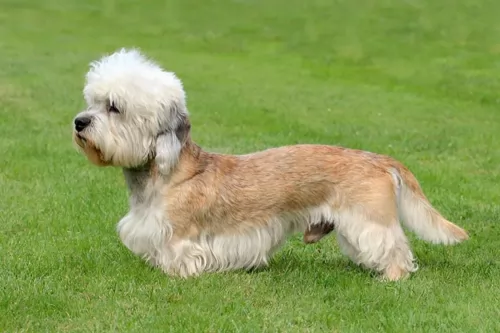 The rough coated Dandie Dinmont Terrier originates from Scotland. They were used centuries ago for hunting otters and badgers.
The rough coated Dandie Dinmont Terrier originates from Scotland. They were used centuries ago for hunting otters and badgers.
There are theories that exist that the dog is a cross between Scottish- and Skye Terriers while others believe there must be some Dachshund in the mix because of the long body of the Dandie Dinmont Terrier.
The Dandie Dinmont Terrier was first recorded as a distinct breed in the late 1600s. The British Dandie Dinmont Terrier Club was formed in 1875 while the American Kennel Club recognized the Dandie in 1886.
 Known also as the Australian Cattle Dog, the Red Heeler is also known as the Blue Heeler. This is a breed of herding dog originally developed in Australia.
Known also as the Australian Cattle Dog, the Red Heeler is also known as the Blue Heeler. This is a breed of herding dog originally developed in Australia.
These dogs are known for their stamina and resilience with driving cattle over long distances in hot weather and across rough terrain.
It was George Eliott who developed the Red Heeler – crossing native Dingoes with Collies and other herding dogs.
In America, the breed was fully recognised in September 1980.
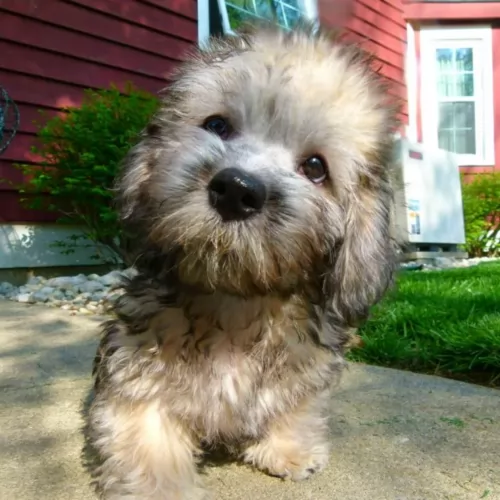 The Dandie Dinmont Terrier is a small dog who stands between 20 – 28cm at the withers and weighs between 8 and 11kg. He is recognizable by his fluffy head of hair.
The Dandie Dinmont Terrier is a small dog who stands between 20 – 28cm at the withers and weighs between 8 and 11kg. He is recognizable by his fluffy head of hair.
He actually has quite a unique look with his long body and slightly over-sized head. He has floppy ears and a long tail. His coat is quite unusual too in that it can be silky and long around the face, legs and belly, while the topcoat is fairly shortish and crisp. His coat color is fawn to brown or reddish. He isn’t a heavy shedder.
Known also as the Dandie, Charlie’s Hope Terrier, the Mustard and Pepper Terrier, the Dandie Dinmont makes an excellent family pet with his calm demeanor, being somewhat reserved around strangers.
He is an alert, intelligent little dog and will warn you of strangers coming into your space. He therefore makes a good watchdog. He is loving and loyal to his human family and will readily fit into life in the city or in the countryside.
They are good with children and pets but with his independent streak, he will require training and socialization if you want him to behave and be obedient.
 The Red Heeler is a medium-sized dog standing at between 43 to 51 cm in height and weighing in the region of 14 – 16 kg.
The Red Heeler is a medium-sized dog standing at between 43 to 51 cm in height and weighing in the region of 14 – 16 kg.
He is muscular, with a sturdy build. The coat of this robust dog is shortish and thick and quite often you’ll find a white star marking on he forehead. The coat is a blue-grey color or reddish. The tail of this dog is long and the ears are erect.
The Red Heeler has always been a working dog so he is energetic and lively, being independent and strong-willed.
He is super intelligent too and can be easily trained and socialized. He is a dog that simply loves the outdoors and if you don’t live on a farm, he is going to need lots of exercise.
He gets on well with kids and other pets, but children should be taught to respect him and be kind towards him, otherwise he might not tolerate them. He is a loyal, protective dog, wanting to ensure the safety of his human family.
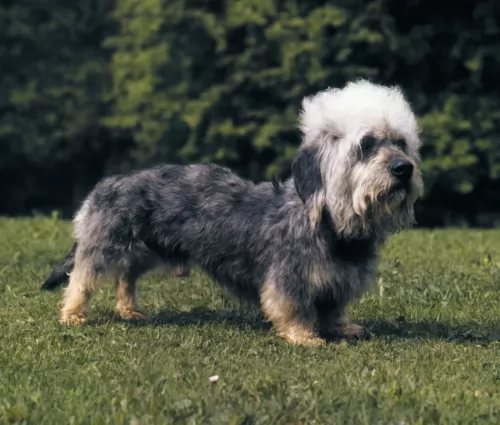 Your Dandie Dinmont is capable of being a wonderful companion. He loves spending time with his human family and is affectionate and loyal.
Your Dandie Dinmont is capable of being a wonderful companion. He loves spending time with his human family and is affectionate and loyal.
The small Dandie is able to fit into life in the city or country, just so long as he has his human family with him. Because he comes from Terrier dogs, he is no push-over though and he has an independent streak which will benefit from training and socialization.
Make sure you give this small dog of yours plenty of love and good care and you will find that you have a loyal, devoted friend in him.
 When you bring a Red Heeler into your home, you must know that you’re never going to have a dull moment. They’re not content to lie around with nothing to do. These popular dogs literally coax you to come out and to be active.
When you bring a Red Heeler into your home, you must know that you’re never going to have a dull moment. They’re not content to lie around with nothing to do. These popular dogs literally coax you to come out and to be active.
Red Heelers need lots of activities and lots of room, so they aren’t particularly suited to life in the city. Large properties and plenty to do is what they ask for.
Your Red Heeler is going to make a splendid pet, loyal and devoted, the perfect example of man’s best friend.
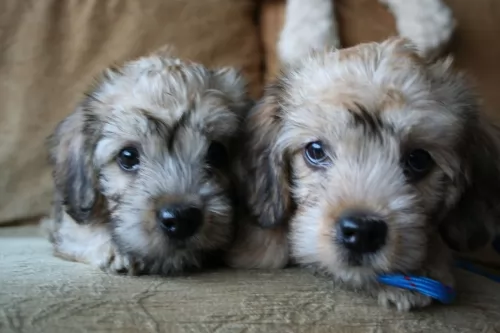 Your pet Dandie Dinmont is a robust little dog who, with good care, can live to be anything between 12 to 15 years of age.
Your pet Dandie Dinmont is a robust little dog who, with good care, can live to be anything between 12 to 15 years of age.
With every dog breed there will be health concerns, and these can include illnesses such as epilepsy as well as hypochondroplasia. All dogs have the potential to fall prey to health problems, and getting your pet from a reputable breeder can help to ensure you eliminate some of these diseases.
This small dog has a long body which means he can be affected by spinal problems. Genetics and body shape play a large role. Intervertebral disc disease is a condition where the cushioning discs between the vertebrae of the spinal column herniate into the spinal cord space. The discs press on the nerves and pain and paralysis can follow.
 Your Red Heeler can live to be 15 years of age with good care. Every dog however, can fall prey to some of the many common dog diseases there are, some of which can be -
Your Red Heeler can live to be 15 years of age with good care. Every dog however, can fall prey to some of the many common dog diseases there are, some of which can be -
There are quite a lot of congenital and inherited musculoskeletal disorders in dogs, with some of the more common ones being hip dysplasia and muscular dystrophy for instance.
There are some of these musculosceletal problems which can be fatal. Some of the typical symptoms you’ll see with these problems are difficulty climbing stairs or jumping, loss of muscle mass in the hind limbs, arthritis and lameness.
The retina of the eye is that light-sensitive part and which is part of the central nervous system. With retinal degeneration, the cells decline, leading to impaired vision and sometimes even blindness.
Some symptoms to look out for include dilated pupils, night blindness and the inability to see clearly in bright light. The disease worsens over times with sudden blindness being quite common with older dogs. Your vet will want a thorough history of your dog’s health.
Other dog diseases to be very aware of are cancer, obesity, bloat, hip dysplasia and epilepsy.
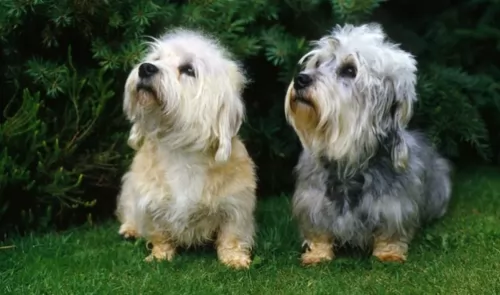 The Dandie doesn’t require as much exercise as some other dog breeds but you want to make sure he goes with you on your walks, or you play ball with him in the garden. You don’t want to see a small dog like this becoming obese as it can herald in a host of health problems.
The Dandie doesn’t require as much exercise as some other dog breeds but you want to make sure he goes with you on your walks, or you play ball with him in the garden. You don’t want to see a small dog like this becoming obese as it can herald in a host of health problems.
The Dandie Dinmont Terrier doesn’t shed a hang of a lot but still, you will need to brush him twice a week to get rid of those loose hairs. Also, the coat will require stripping twice a year. Some dog owners who prefer a low maintenance breed might not like knowing this, but it is a necessary part of his grooming. There are some dog owners who cut the hair rather, but then the texture of the coat will change. This is only important to know if you want to show your Dandie. Other Dandie owners take their pets to a professional groomer for clipping.
Because the Dandie has floppy ears and a lot of hair around the face and ears, you will need to check his ears for dirt and wax build-up as these can cause an ear infection. If you’re nervous to be going inside your dog’s ears, the vet or the dog groomer can show you how.
Also, little dogs like this are prone to tooth decay, and you will need to brush his teeth 2 or 3 times a week. This is because plaque and tartar buildup can cause mouth infections which contribute to other diseases within the body.
 The Red Heeler is an active dog, and apart from walks which will give him the chance to sniff around, he will need lots of other forms of exercise. Rope pulling games he’ll love and running after a ball will please him because it takes him back to days when he used to run around and herd livestock.
The Red Heeler is an active dog, and apart from walks which will give him the chance to sniff around, he will need lots of other forms of exercise. Rope pulling games he’ll love and running after a ball will please him because it takes him back to days when he used to run around and herd livestock.
If you’re an outdoorsy type of person who loves hiking in the wilds and swimming in rivers, you can count this dog in.
You can look at the Red Heeler as a low maintenance dog. He does shed, but a good brush of the coat twice a week will be excellent for him. If he doesn’t wear his nails down naturally, you will need to trim them. Also, while you are brushing him, check his ears and eyes and inside his mouth to make sure he is clear of all infections.
Red Heelers rely on good food for their resilience and stamina, and for convenience it is good to have commercially manufactured dog food as a backup. The best is home-made food which is easy to prepare and totally uncomplicated.
Simply add into one big pot chicken, brown rice or pasta and spinach, sweet potatoes and carrots. This food can all be chopped up, refrigerated and added warmed up and in small portions to your pet's dry kibble once or twice a week. Simple and tasty, your Red Heeler will love it and thrive on it too.
Ensure there is always a bowl of fresh, cool water within his reach.